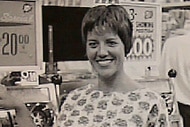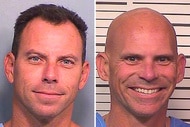Create a free profile to get unlimited access to exclusive videos, breaking news, sweepstakes, and more!
How One Of Cleveland’s Most Notorious Bank Robbers Lived ‘Unassuming Life’ In Massachusetts For 52 Years
Before stealing $215,000 from a bank in 1969, authorities say Theodore John Conrad had become obsessed with the 1968 Steve McQueen movie "The Thomas Crown Affair" and had bragged to friends about how easy stealing the money would be.

On Friday July 11, 1969, Theodore John Conrad walked out of his job as a teller at the Society National Bank carrying $215,000—today's equivalent of about $1.7 million—before he mysteriously vanished with the stolen money, managing to pull off one of Cleveland’s largest bank heists in history.
For more than 50 years, the baffling case remained a mystery, until investigators discovered that for decades Conrad had been living an “unassuming life” in the suburb of Lynnfield, Massachusetts under the fictitious name of Thomas Randele, according to a statement from the U.S. Marshal’s Service.
By the time investigators discovered the notorious bank thief, he had died of lung cancer at the age of 71, only revealing his secret identity to his wife and daughter on his death bed earlier this year, according to Cleveland.com.
Before the brazen heist, Conrad had led a quiet life in Cleveland, Ohio attending classes at Cuyahoga Community College after graduating from high school.
In January of 1969—just seven months before the robbery—Conrad began his job at the Society National Bank, where he worked in the bank vault delivering cash to tellers and various bank branches, the local outlet reports.
“To all appearances, Conrad was that All-American boy whose character was not questioned and seemed to be a model of responsibility during a turbulent time,” said a summary report complied by the marshals obtained by Cleveland.com.
The job put him in contact with hundreds of thousands of dollars of cash each day.
According to authorities, Conrad had also already become “obsessed” with the 1968 Steve McQueen movie “The Thomas Crown Affair,” about a businessman who committed a bank robbery for sport, and had seen the film more than half a dozen times.
“He always thought of himself as being like Steve McQueen in that movie,” William O’Donnell, a former classmate and roommate told the outlet.
Conrad “bragged to his friends about how easy it would be to take money” from the bank and even told them that he had planned to rob the bank, but his friends didn’t believe him, the U.S. Marshals office said.
Conrad decided to make his move on July 11, 1969, when his supervisor was away having surgery. The day of the heist he met with his best friend, Russell Metcalf, to have lunch.
“I had no idea,” Metcalf told Cleveland.com Friday. “He always said the security was lax. He said it wouldn’t be hard.”
Later that Friday, Conrad finished his shift and walked out with $215,000. The bank employees wouldn’t discover the missing money until Monday morning, when Conrad failed to report to work, giving him a two-day head start on law enforcement.
For years investigators tracked down leads that took them to Washington, DC, California, Texas, Oregon and even Hawaii, but there was no sign of Conrad.
The case was even featured on “America’s Most Wanted” and “Unsolved Mysteries” but the elusive thief had vanished without a trace.
Peter J. Elliott—now a United States Marshal himself—remembers the case haunting his father, John K. Elliott, who was determined to chase down the man he believed was “nothing but a thief.”
“One of the reasons I stayed after this guy is that some people thought he was some kind of hero or Robin Hood. He’s not,” John Elliott told The Plain Dealer in 2008.
Even after retiring in 1990, John Elliott continued to pursue the case.
“My father never stopped searching for Conrad and always wanted closure up until his death in 2020,” Peter Elliott said in the statement from authorities.
Peter Elliott told The New York Times that the mystery finally unraveled after authorities saw an obituary in the paper for Thomas Randele and noticed striking similarities between Randele and their suspect.
Randele’s obituary listed his birthday as July 10, 1947. Conrad’s real birthday had been the same date just two years later on July 10, 1949. His parents names were also almost exactly the same and his actual birth place of Denver was listed.
Elliott declined to tell the paper what initially led them to the obituary.
“When people lie, they lie close to home,” Peter Elliott said of the similarities.
The final piece of the puzzle fell together when Peter Elliott looked at Conrad’s signature on a college application his father had first tracked down and noticed it seemed to match a signature Randele submitted in a bankruptcy court document in 2014.
After making his getaway, Conrad lived a quiet life in Lynnville working as a golf pro and selling luxury cars near Boston for 40 years. He never told his family his secret until he was on his deathbed.
His wife Kathy, whom he married in 1982, told The New York Times on Saturday that she and the couple’s only child, a daughter, were “still mourning his loss” and called him a “wonderful dad and a fabulous father.”
She echoed a similar sentiment to Cleveland.com, telling the local news outlet her husband had been a “great man.”
Ironically, Conrad had chosen to settle down not far from where the original “The Thomas Crown Affair” had been filmed.
Metcalf said he had always hoped he would reconnect with his one-time best friend.
“Say what you will about him, but Ted was a good person,” he said. “I kept hoping that I would see him, but now I’ll have to wait.”
For Peter Elliott, the discovery finally allows him to provide some closure to his father’s life-long pursuit.
“I hope my father is resting a little easier today knowing his investigation and his United States Marshals Service brought closure to this decades-long mystery,” he said. “Everything in real life doesn’t always end like in the movies.”























